Text
the finale
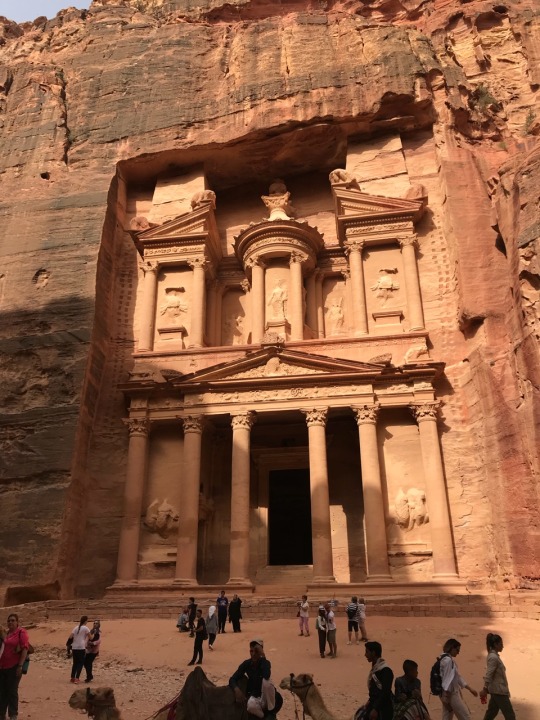
Today, I was able to check “visit Petra” off my bucket list. As our group filed through Bab Al-Siq, I watched everyone’s eyes widen as we silently raised our cameras to capture the scene. The first moments in the old city were ones of shock; the shock quickly turned to glee as we realized that one of the seven wonders of the world was our playground for the next five hours.
In record time, we made it to the first and most famous stop: the Treasury. Inaptly named, the Treasury never had anything to do with money; like every formation in Petra, it was built as a tomb. As the structure towered over us, our faces turned to the sky, and we tuned out the merchants and tourists bustling around us. Indeed, in that moment, the area around the city could have still been a city. Camels were led by men laden with kohl eyeliner, and tourists were drawn to tents by a combination of silver jewelry and yells of “two dinar!”
Once our group made it to the Treasury, we were turned loose. The Monastery, four kilometers away, was everyone’s final destination. Some, however, chose to decorate their route with detour hikes. My friend and I were one such group; our travels took us to Petra Rose, a tea and spice shop next to the Royal Tombs. The owner, Mazin, spoke impeccable English (as well as apparently Spanish and Italian) and passed around everything from frankincense to hibiscus for us to smell. Incredibly knowledgeable, Mazin made his own blend of tea in front of us. Obviously, we loaded up and smiled at the thought of drinking a bit of Petra in our rooms at home.
We continued our hike: through sand, up 800 stairs, and past dozens of cafes advertising fresh-pressed juice. In this way, I was weirdly reminded of Disneyland. Petra was, in a way, a really old and beautiful theme park. Men offering donkey rides approached us at every turn, and yells of “three dinar” faded to two “just for us.” What struck me most, however, was the cafes. I don’t know why, but they’re what immediately made me think of Disneyland— the way both venues have them laid out strategically between landmarks, both offering an experience that is supposed to be signature of its respective home. Maybe I’m overanalyzing, but I couldn’t help draw parallels. In this way, I don’t know if I was impressed by the entrepreneurial spirit in Petra or saddened by the reach of capitalism to the deepest corners of the Earth.
I could have spent the whole day in Petra, neglecting the main trail and taking every detour possible. I met people from all walks of life: from Mazin, who has never studied in Europe but speaks English with a Western accent, to an Irish couple whose photo we took near the monastery, to Sara, a Bedouin girl of maybe twelve who absolutely finessed us out of our money. From photos alone, it’s not hard to see why the city has been named one of the Seven Wonders; once there however, there’s more to marvel at than the architecture. The conglomeration of different peoples gathered for the same purpose created a certain spirit of curiosity that was a ‘wonder’ in and of itself.
0 notes
Text
camp doc
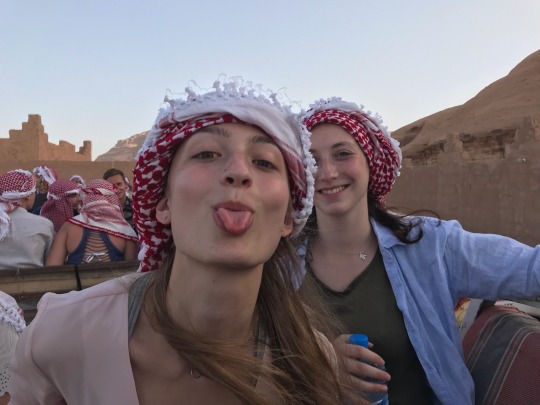
Next to my right eye, I have 6 bug bites framing my face like a crescent moon.
I’m not sure what I thought would happen when I slept outside after not washing my face for 48 hours, but when I looked in the mirror Sunday morning, I was appalled. Staying the night at a Bedouin camp in Wadi Rum was a life-changing experience— but it didn’t do my skin any favors.
We arrived around 6:00 Saturday night and immediately loaded into the beds of the Bedouin men’s trucks to ride through the desert. Our heads swathed in keffiyehs, we squinted to avoid the sand flying at us. Periodically, we’d stop to explore: by ‘explore,’ I mean roll down hills, fall over posing for photos, or get stuck in sandstorms. At 8:30, when we returned to the camp, we couldn’t have been more ready for dinner. And dinner did not disappoint— carrots, rice, and chicken that had all been cooked in the earth that night covered the buffet table, and we scrambled to get in line. I talk way too much about food, but the most important takeaway from that night is that I’ve never tasted better chicken.
After dinner we danced dabka around the fire before walking into the desert and laying down on the rock. With no streetlights or houses to shine light on us, it was impossible to see anything but stars: a welcome intermission from the hustle of our daily lives. At 2:00 we retired to our beds, mustering our strength to drag our mattresses out from our tents and into the open air.
A night under the stars in Wadi Rum sounds serene, and it was— minus the bugs. Cuddling with mosquitos was not on my itinerary. However, in the name of nature, I pulled my blanket up over my head and mentally cursed the flies settling in with me instead of moving inside.
It’s hard to believe that just yesterday I woke up in the desert. The past week, each day in our journey through the South has brought a vastly different experience; in shah allah, I’ll never forget this one.
0 notes
Text
mint leaves
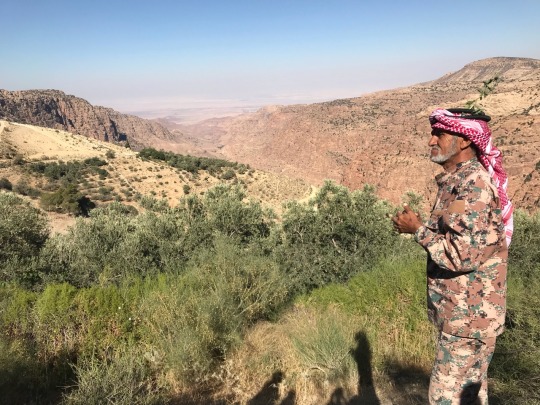
“Everything the sun touches is the Hashemite Kingdom.”
Thus was titled one of the winning photos from last year’s fall photo contest at Northeastern’s College of Social Sciences and Humanities. Having cast my own vote for the photo, I was giddy when I met it’s subject on Thursday.
The photo was striking: a Jordanian man clad in military gear with a traditional kaffiya around his head, gesturing against a backdrop of hazelnut mountains that stretched as far as the eye could see. The same man met us at the gates of the Dana Reserve Thursday afternoon; I recognized Abu Yahya, now 66, immediately as the famous man from the photo. Though he had grown up on the reserve, his English was impeccable, and he schooled us on the history of the village and the actions of the United Nations in relation to it.
At 7 AM on Friday, my alarm rang and I awoke to the first day of Eid. Our group filed into the hotel restaurant for breakfast, taking advantage of the opportunity to fuel ourselves for the 3-hour hike that laid ahead. An hour later, we were off; Abu Yahya led us over rocks and through bushes in a trek that, to us was a once-in-a-lifetime experience, was to him a daily routine.
The view from the trail is something that I’ll never forget. Every once in a while, Abu Yahya would stop to let us scale the rocks jutting out from the mountain or pick some wormwood for us to smell. I was stunned by his knowledge of the mountain; he described the crops, everything from pomegranate to mistletoe, and pointed out the minerals that color each layer of rock. But for all his wisdom, he had an air of lightness, of playfulness, that I admired. He would pose for pictures with us or tuck a sprig of mint in my hair, laughing all the way. To me, the eclectic blend of age, wisdom, humility, and playfulness that made up Abu Yahya’s character was something to be emulated. Moreover, meeting him made me appreciate his background, and I wondered how different I would be if I had grown up in Dana as well.
0 notes
Text
homesick
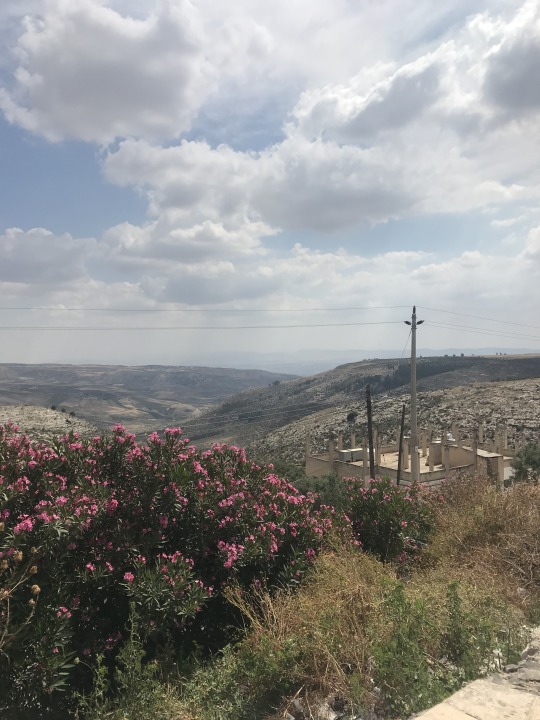
5:30: We return home from a day in the mountains lining the Dead Sea.
6:15: We’re on a bus to meet with Syrian families for Iftar.
Once off the bus, we grouped ourselves into sets of 10, each of which would be having Iftar with a different family. Armed with boxes of food, plastic plates, and even face paint, our 45-man cavalcade marched through the streets to our respective destinations. Once we made it to my stop, past the onlookers that had gathered to watch us, we were welcomed by our host family for the night.
Twelve of us filed into the sitting room, which doubled as the children’s bedroom. As we sat down on the mats lining the walls, the two toddlers napping on the bed groggily rubbed their eyes. As they came to, their parents started unpacking the food we brought, laying four platters of chicken and rice on the ground. We accompanied the main course with yogurt, french fries, nectarines, and cucumber— not to forget liters of juice to wash it down.
The relationship between our host mother and father struck me as something truly genuine. Sitting on opposite sides of the room, they laughed as they lobbed the bottles of juice over the food at one another. After, I noticed them spraying one another with a makeshift spray bottle. There was something youthfully innocent about their interactions— a ray of sunshine in light of the hardships they endured.
After dinner, we began to speak about those hardships. With our friend Aya as our translator, the students gathered on the patio to listen to our host mother speak. In 2013, the family became refugees; in a situation she described as “funny enough,” fleeing Syria was a game-time decision. Five years ago, she was visiting her brother in Jordan, who was a refugee being housed in the Zaatari camp; while visiting, siege was laid to her neighborhood, and she decided that staying in Jordan was the only option. All she had was what she had brought for the trip; her family left everything in Syria, including their comfort and opportunities.
Now, the four kids are enrolled in school, the oldest of which is 17. Education was something we spoke about a lot— the Syrian and Jordanian education systems are vastly different, and the oldest child ended up staying back a year. Aside from the nature of schooling, entering the Jordanian education system brought social issues. The mother described the bullying experienced by her children, an ordeal that is unfortunately common amongst refugees all over the world.
If I were to outline the hardships that the family endured, from one fitting six people in a one-room home to struggling to find steady work— I could write for hours. Indeed, hardship was no stranger in Syria either; but, they all described the same longing to return to Damascus. Even the daughter, who wasn’t more than 13, described a life in Syria as “more beautiful” than one in Jordan. In fact, the mother cited her children as her main motivation for staying in Jordan; as much as they all wished for a life in Syria, it’s just not possible. In order to ensure that the children have a life, period, Jordan is the only option.
No matter where you’re from, home is home. I’m lucky to have one.
pictured above: Syria as seen from Umm Qais
0 notes
Text
not wadi mujib
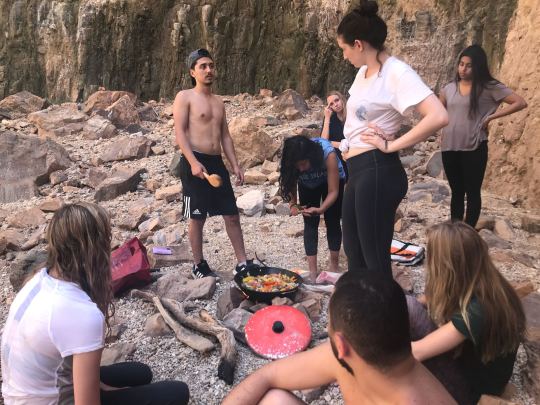
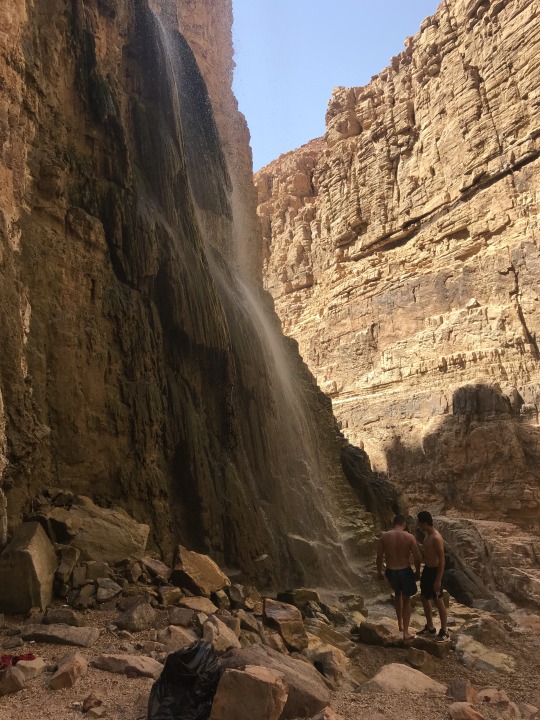
Every time I text my parents “today was the best day of my life!” I turn out to be wrong after another amazing day a week later.
I’ll set the scene: a hundred feet above us, the terracotta mountains of Jordan were held back by a clear blue sky. The rock, layered from years of accumulation, looked like every stock photo that made you think “wow, that’s amazing.” As we took off our shoes, feet sore from hiking, our t-shirts dried on our backs. To our left ran the waterfall, the main attraction of our visit— as we made ourselves at home, the jingle of running water harmonized with the blare of Led Zeppelin through our speaker.
This is where I went on Saturday, in the mountains a stone’s throw away from the Dead Sea. We were brought there by Mustafa, our uber driver-turned-friend-turned-tour guide, and his friends, Omar and Muhammed. The trio, my gratitude for whom is insurmountable, led me and my seven friends through rivers and up ropes to get to the waterfall. Looking around at our little enclave, my thoughts were a surprising mixture of “how am I experiencing this” and “this weirdly reminds me of home.” With classic rock blaring— a surprising but welcome addition from Muhammed— meat cooking on a fire, and my friends laughing around me, it was just like my camping trips at home. Granted, the setting here was a bit nicer. But it was bizarre to me that two places so far from one another in both geography and similarity could give me such similar experiences.
One of the most amazing parts of our hike was that our group was completely alone. Jordan is full of amazing nature; however, unlike many of them, the trail we took was unnamed and unpublicized. No tourists (aside from the obvious eight, I guess), restrictions, or wink of capitalism. Maybe we didn’t go to Wadi Mujib, but we went to something better— something only experienced by people who knew the land.
Indeed, the people were the best part. In a city so unlike my own, I somehow found people with the same interests, plans, and ideals as me. Mustafa, Muhammed, and Omar are three of the most kind-hearted people I’ve ever met, going so far as planning a meal for us even though they were fasting for Ramadan. If there’s one thing I’ve learned from my travels here, it’s that it’s not hard to find a kind soul.
People really are the same everywhere.
#hiking#dead sea#jordan#nature#outdoors#tourism#hospitality#best destinations#best destinations in jordan
0 notes
Text
masjid al-malik abdullah I
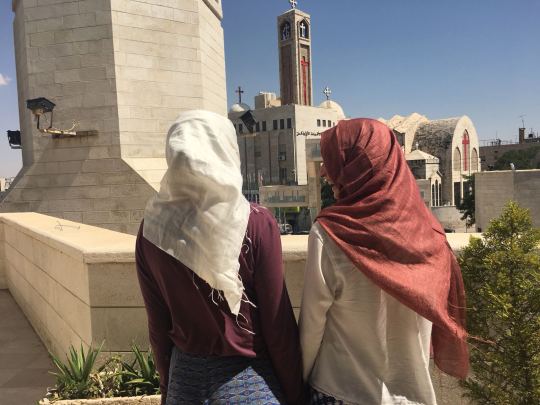
As someone who’s never been religious, I find the gargantuan role that religion plays in daily life intriguing. Like most of the United States as a whole, my hometown is overwhelmingly Christian; although I don’t follow the religion and have never attended a service, I’ve researched its interplay with US politics and interviewed its followers.
In sum, I’m intrigued by the pull that religion has on its adherents, especially from the vantage point of someone unaffiliated. That’s why, when our group visited the King Abdullah I Mosque in Jordan on Wednesday, I was eager to hear Nidal speak of the influence of Islam in his life.
Although unmentioned by Nidal in his lecture, central to our visit was the role of the hijab. As a sign of respect, the women in our group were asked to cover our hair before entering the mosque. Nidal’s daughter Aya, who works as a ‘cultural attache’ with our program, patiently helped us wrap our scarves as we lined up in front of her. In the United States, the role of the hijab is often misconstrued— those who are ignorant, hateful, or both tend to characterize it as an instrument of oppression. That’s why, when a boy from my high school littered the comments of my photos at the mosque with words like “disgusting” and “terrorism,” I was more saddened than surprised. With my head wrapped, I felt proud. Rather than feeling a culture forced upon me, I felt proud to have been welcomed into it. Ignorance is dangerous; the boy who commented on my photos has most likely never traveled outside the US, let alone to a mosque in the Middle East, and would rather regurgitate soundbites from Fox News than pay attention when Islam is addressed in class. People absorb the opinions of others because it’s easy; more difficult is choosing to take advantage of your right to education, looking at material from both sides of a debate, and becoming secure in the fact that you’re not always going to be right. Thus, my education on Wednesday was twofold. Indeed, I learned a lot about the theology of Islam from Nidal as well as Ramadan’s place within it. However, the dynamic of ignorance and hatred, although visible to me before, was brought in front of me. There’s no excuse for the bigotry that was posted by my former classmate; however, realizing that it was molded by a life of shelter and privilege made me proud for those who actively seek knowledge and hope that some day he’ll do the same.
0 notes
Text
house of nidal
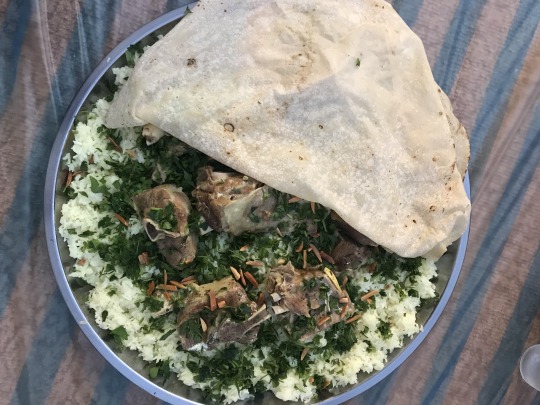
“It’s great to be in Amman; but Amman is not Jordan.”
Last night, after a day at Umm Qais, we were welcomed into the home of Abu and Om Nidal in the region of Irbid. Abu Nidal, father of our tour guide Nidal, is also the leader of the Bina Issa tribe. A Bedouin community tracing its origins thousands of years back, the Bina Issa tribe has made a home for itself in Irbid beginning in just 1983. Jordan itself is a melting pot of different nationalities; outside the hustle of Amman, however, we were able to see the roots of the country.
Single file, we lined up outside of Abu Nidal’s home to take our shoes off before entering. We congregated outside on the terrace, where mats lined the floor for us to sit on. You couldn’t imagine a better scene; barefoot, outside, and all sitting together under the sunset. One by one, Nidal’s brothers laid down plates of steaming Mensef in front of us, all of which were prepared by Om Nidal and her daughters. Once the sun had set, Abu Nidal traversed the lines of students eating, sitting to show us the proper way to eat Mensef with our hands. It was funny; as simple as his directions were (rolling the rice in your palm and pushing it into your mouth with your thumb), we just couldn’t seem to follow them properly. After dinner, we sat nursing our food comas with a pot of cardamom tea while Nidal spoke to us. He spoke about the life of Bedouins in Jordan, and implored us to imagine being without electricity, a certain source of water, or concrete walls to lean on. In the same thread, he spoke about the importance of Ramadan; when most who celebrate Ramadan begin their daily fast, they do so with the knowledge that they can expect food at sundown. For many in the world, this is not the case. Ramadan is a time of sacrifice in honor of them.
In the most heartwarming turn of the night, Nidal stood up to wish a happy birthday to the students who have celebrated theirs on the trip. As it turned out, it was also Nidal’s nephew’s birthday, a young boy named Safwan. As we made our way into the living room, we were met with four cakes waiting for us. Renditions of ��Happy Birthday’ in both Arabic and English ensued, and I don’t think anyone in the room could have felt anything but warmth.
This is Jordan.
As I’ve been in other homestays I’ve experienced, I was inspired by the hospitality of our hosts. With over a dozen people already living in the family home, they welcomed another forty. I can’t imagine the time that the women must have spent preparing the home and the meal for us— their sons and daughters, brothers and sisters, as they called us. I don’t have the fluency to express my gratitude adequately in Arabic, but I tried; when I tapped Om Nidal on the shoulder and smiled “Yatik Al-Afia,” she pulled me in and kissed my cheek.
1 note
·
View note
Text
three’s company
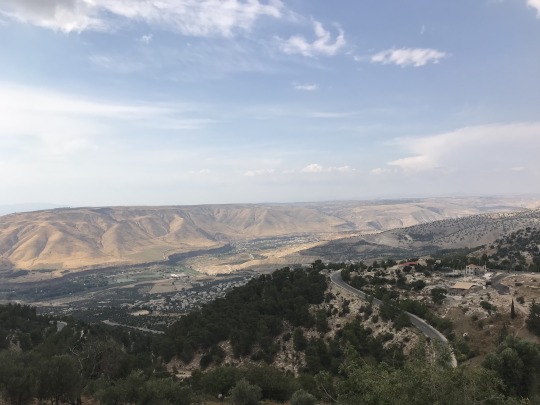
I’m blessed to have traveled to six countries outside my own; yesterday, I saw two more. In what was by far the best day of the trip, we traveled to Umm Qais, a Roman ruins site two hours outside of Amman. The ruins themselves were beautiful, as they always are, but the view is what we came for. From the acropolis of Umm Qais, we could see Israel to our left and the mountains of Syria on our right. Sitting at the overlook, I was awestruck; as much as I tried, no picture will ever be able to capture what I saw.
Stationed between the Sea of Galilee and the Syrian mountains was the Golan Heights, one of the most contested areas in modern politics. The rocky expanse of the Heights was massive— this is what the world is fighting over. My feelings upon seeing the famous region were a mixture of awe and sadness; on one hand, I wouldn’t trade being able to see the area for the world, and I think I’m better because of it. On the other, I couldn’t help but think about the lives lost in clashes over the territory. And there I was, safe on the other side, as a tourist.
It’s easy to feel guilty. Guilty about your privilege: your money, your nationality. What’s important is that we channel our privilege into a positive force for change. Sitting at the overlook, I hope that everyone in our group was humbled. As Americans, we tend to feel all-knowing; but it’s our country that’s big, not us. As individuals, we’re just small parts of the mechanics of the world, and being at the intersection of three borders reminded me of that.
1 note
·
View note
Text
seeing vs. believing
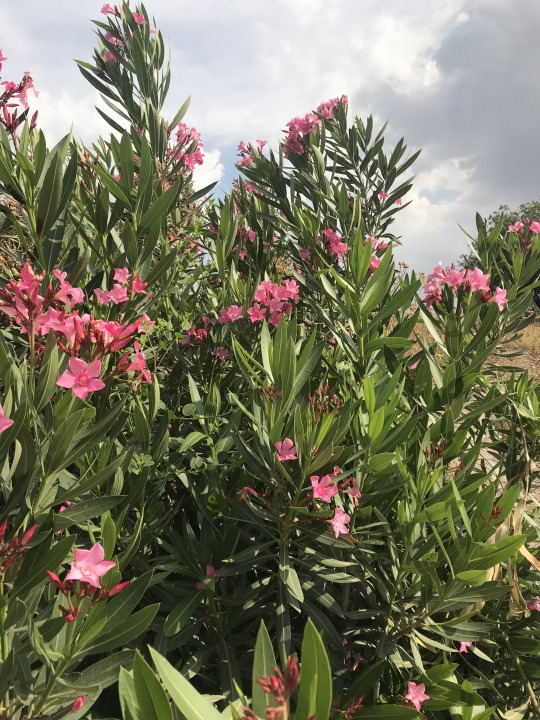
Today I want to talk about visibility. As Americans, we should know our privilege— although the hierarchies of race, gender, immigration status, and income in the United States are not to be diminished, we live in a democratic state that is one of the wealthiest in the world. We know that there are people who aren’t as lucky as us, sure—but how often do we see the homeless, the stateless, the sick?
According to the Jordan Times, roughly a third of the Jordanian population is composed of refugees. Countless more Jordanians are homeless or below the poverty line. Every day, as I walk from school to the gym, I pass a homeless woman and her daughter camped on the bridge. One day, I was able to speak to her— she came to Jordan from Egypt, and that day she was sitting with a Palestinian woman as well. Because of dialectic differences it was somewhat difficult to communicate, but since there were a few of us there, we were able to get by. Yesterday, a young boy came to our apartment door clutching immigration papers. In Arabic, he told us that his mother was sick and asked for money.
Don’t let seeing be believing. In Jordan, a large portion of the homeless are refugees; although homelessness certainly exists in the United States, Americans usually don’t associate homelessness with statelessness. Just because we can’t see the refugee crisis from the New Jersey suburbs doesn’t mean it doesn’t exist— we have every channel of knowledge available to us, so why don’t we educate ourselves? Americans underestimate the level of influence their state has had in the events that promulgated the refugee crisis in the Middle East; if we continue to blindly vote for politicians who refuse to stem the tide of disaster, we are failing at upholding the central tenets behind the democracy we take so much pride in. No matter what your views are on current American politics, make them informed. Ask yourself; if you sat down with refugees, if you saw them, would your opinions be the same?
0 notes
Text
crossroads
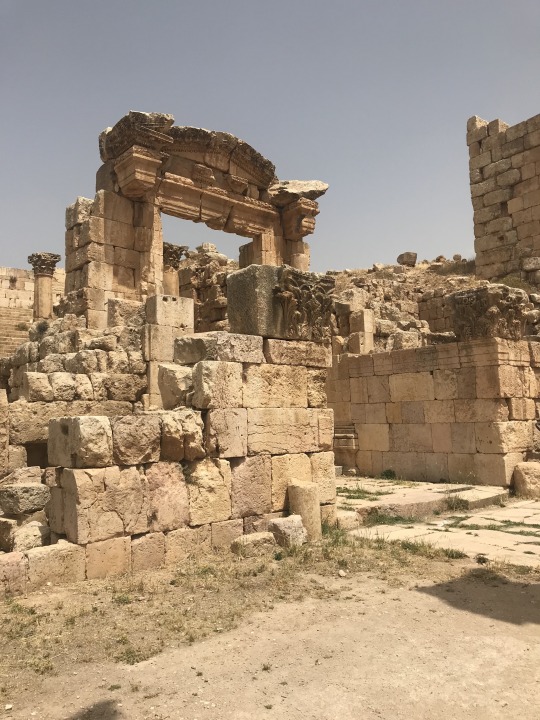
On Saturday, we went on our fourth group excursion— a day visiting the ruins at Jerash and Ajloun. Of the two sites, we spent the most time at the former; referred to by our tour guide as “the Pompeii of the Middle East,” a good part of the sprawling city was left intact. As I recalled the tour of Pompeii I had taken two years ago, I saw that Ahmed was right. To look at the barren rows of Corinthian columns and imagine a main square abuzz with vendors was a surreal experience. Sitting in the amphitheater of the old city, I imagined the seats lined with people: all with their own perceptions, experiences, and expectations. How many people have sat in the seat I was in, tourists and ancient peoples alike? In the second century, what was the woman in my place watching, and what was she thinking?
As in many places in Jordan, striking to me in Jerash was the juxtaposition between the old and the new. Barely outside the border of the old city laid a main road lined with functioning shops and homes. Living in New Jersey, sites like Jerash are once in a lifetime opportunities; to the people of modern Jerash, they compose the backdrop of daily life. In fact, Ahmed addressed the combination when approached by my friends and I; in recent years, the old city was up for consideration as a UNESCO World Heritage site. However, today the site is on the department’s ‘tentative list’ only. According to Ahmed, the deferral of its inscription is due to its surrounding modernity. He told us that, in order to inscribe Jerash as a World Heritage site, the neighboring residential community would have had to be destroyed. In this instance, the Jordanian government didn’t have the money to relocate its inhabitants. As the dialogue has progressed, I’ve become aware of the role that the economy plays in the facets of public administration, foreign affairs, and even domestic culture; the situation of Jerash was another case in point. The ruins are called “the intersection between East and West,” but they demonstrate another type of crossroads— that between global institutions like the United Nations and the domestic affairs of involved states.
#jerash#ajloun#jordan#ruins#roman ruins#unesco#united nations#government#economy#heritage#unesco world heritage
0 notes
Text
new skincare routine
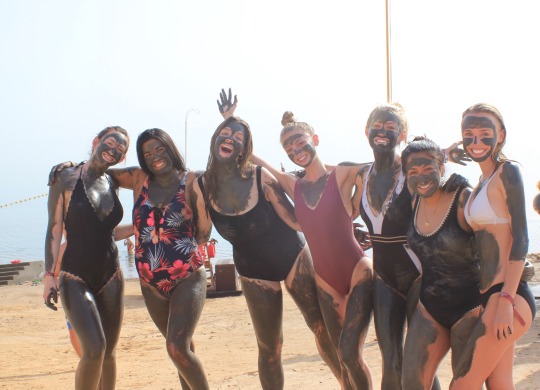
Last Saturday, a group excursion to the Dead Sea left us with sun kissed cheeks and a film of salt over our skin. As usual, our first priority was food; our beeline to the water was broken up by an amazing lunch. After lots of dad jokes that we would still float post-food coma, we all made our way into the water. I’d like to imagine that I made a graceful descent into the water, but my failure to see the sandbags placed to pad our way meant that I stumbled my way over rocks. Obviously, we floated on our backs and took touristy pictures with mud on our faces. But what interested me about visiting the Dead Sea was our medium; we partnered with the Crowne Plaza, a chain with locations 20 minutes away from my home in New Jersey. Unlike the somewhat suspicious Crowne Plaza in Cherry Hill, the hotel here was amazing. With multiple dining rooms and a four-pronged pool, this venue was clearly designed to appeal to an American sense of tourism. It catered to the luxurious, and its juxtaposition to the sandy isolation of the Bedouin communities not ten minutes away was a bit jarring. I have no problem with luxury-- what interested me was the type of luxury. Though its architecture was clearly Middle Eastern, something about the hotel struck me as distinctly Western. The dynamic of tourism there was different than that in downtown Amman in that it allowed the group to be unapologetic in its American-ness. All of our creature comforts were provided; we showed our skin, spoke English to the employees, and were served alcohol even in Ramadan. Don’t get me wrong, it was probably one of the best days of my life-- but I can see how actually staying there would provide visitors with a sense of being home while still being ‘cultural.’
0 notes
Text
circa 7:34
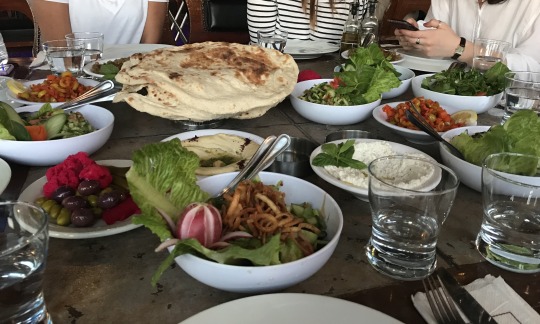
Iftar: simultaneously the most amazing and overwhelming food experience of my life. I consider myself a foodie, and the “following” section of my Instagram page is padded with a variety of brunch blogs. However, no number of visits to Boston coffee shops could have prepared me for this. First came the olives; then, the tabbouleh; then, the pickled vegetables. The servers piled our table with salads and dips, of which we dropped quarter-sized swirls onto our plates. A bowl of pita served as our centerpiece, and we used it to sample our assortment as a painter does his palette. For my table, just the appetizers were enough— the main course and dessert(s) that followed were enough to put us in a food coma. Yes, the meal was amazing—and a great photo op— but, the next day, I found myself angry that I had reduced it to an ‘attraction’ of sorts. With 95% of the Jordanian population identifying as Muslim, Iftar and the context of Ramadan is a major symbol of the strength of religious adherence here. On the first day, I admit that I joined my peers in disappointment as we realized the extent to which fasting limited our options where daytime activity is concerned. Like many, I felt that the sleepy noontime streets and grate-clothed storefronts prevented me from the ‘experience’ of daily life in Amman. This outlook is selfish; given the significance of Islam in daily life here, Ramadan is the experience. Although I’m all for fasting to better understand the experience of the majority of my peers in Jordan— and I’ve done so myself— the traditions of Ramadan shouldn’t be spoken of like a cool fad. When students ask each other “are you fasting?” the conversation shouldn’t be reminiscent of one about the keto diet. I couldn’t be more glad that I experienced Iftar, and I plan to do so again tonight. However, as we enjoy our baba ganoush, we shouldn’t let the significance of our meal get lost in its aesthetic.
0 notes